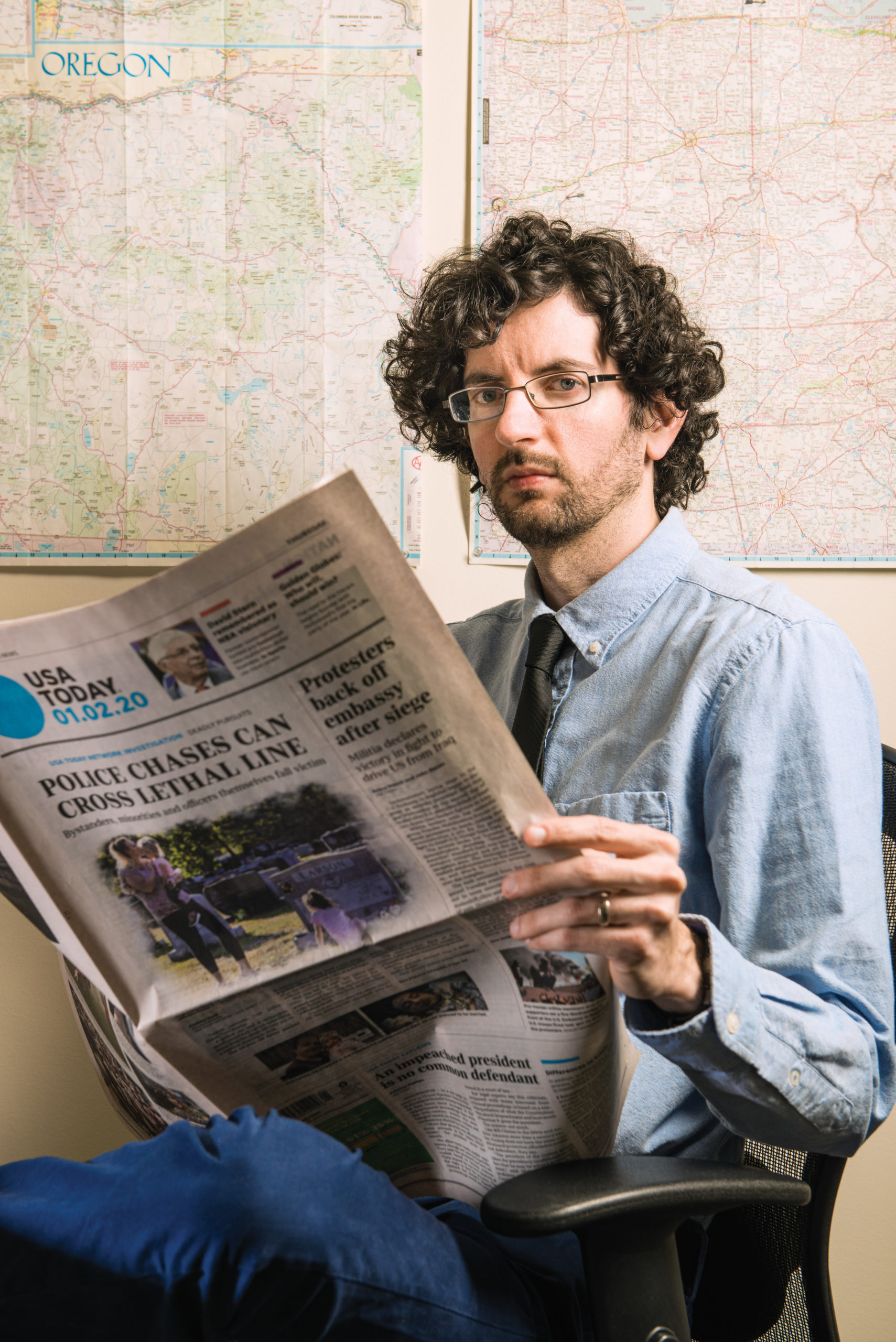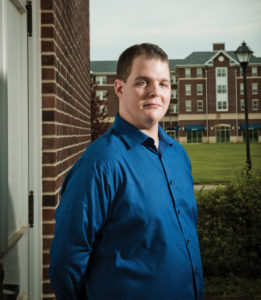The Mazeika Files
Criminology professor David Mazeika and his students make headlines, and change.

Dave Mazeika / TCNJ Professor Criminal Justice
A professor and his students chase data for investigative reports that lead to big change.
When the Asbury Park Press published its 2018 series on police misconduct, David Mazeika inhaled every story — all 19 of them. Mazeika, an assistant professor of criminology who’d grown up in Monmouth County poring over sports box scores in the newspaper, was amazed by the scope of reporting and use of data to shed light on rogue cops. One story in particular, involving a man who died after police forcibly restrained him at a music festival in nearby Howell, stuck with him.
“It was unbelievable stuff,” Mazeika says. “And it was happening in my backyard.”
An idea began to percolate.
Mazeika realized an opportunity existed to support newspapers stretched thin by diminishing resources and, at the same time, provide students with hands-on research experience with real-world stakes. He invited one of the lead reporters, Andrew Ford, to visit campus and talk about the misconduct series with the students.
At the end of the visit, Mazeika made his pitch: Why not work together?
It was the beginning of an unusual partnership that has so far yielded two collaborations between the newspaper and the college, including a groundbreaking investigation that appeared last year on the front page of both USA Today and the Asbury Park Press that revealed the dangers of police car chases in New Jersey.
Mazeika helped Ford sift through and analyze more than 4 million arrest records, where they found that over the last decade, at least 55 people were killed and more than 2,500 were injured in car chases, nearly half of those being bystanders and police officers.
Three criminology students — Nicholas Scales ’20, Rich Kyle ’22, and Hailey Stack ’22 — gathered and summarized police car chase policies from other states. Mazeika held weekly meetings to field questions and oversee their progress, but let the students take charge of the research. The trio divided up the 49 other states and, for several months in the fall of 2019, chased down answers, calling and sending hundreds of emails to police departments, records clerks, and offices of state attorneys general across the country.
They discovered that New Jersey’s police pursuit guidelines are the most detailed in the country, and allowed the police broad discretion to chase vehicles that they thought posed an immediate safety threat. But the reporting from Ford and his TCNJ partners showed that many of the pursuits were not instigated by serious crimes but instead prompted by minor offenses. For example, in the last decade, according to their research, at least 23 fatal chases began with minor traffic infractions.
As a result of these findings, New Jersey’s attorney general, Gurbir Grewal, recently restricted the ability of the police to instigate car chases. To start a pursuit, officers must now suspect someone of having committed a first-degree or violent second-degree crime; any threat to public safety must be related to the person’s actions before police tried to stop them rather than stemming solely from any speeding or evasive driving in response to the pursuit itself.

Using his research skills to help make New Jersey safer for both civilians and police officers resonated on a personal level for Scales; his father, a state trooper, died in the line of duty when Scales was 6 years old.
“We worked so hard, and it made a difference,” Scales says. “We had an impact on policing policy in New Jersey. That is monumental.”
Ford, who first worked with Mazeika and some of his students on a project about fitness standards for police recruits, says the collaboration accelerated his reporting.
“If I didn’t have Dave and his students to call upon, either it would take me much longer to try to do that work myself, or it would be something that we might not be able to afford,” Ford says. “I’ve heard of newspapers working with journalism students but I don’t think I’ve heard of any working with criminology students. That, I do think, is unique and pretty cool.”
For Mazieka, the partnership provides a chance to pursue the applied research he loves in a venue that can reach a wide audience.
“I think we’re all in this to make a difference,” he says. “At least I am.”
Mazeika’s interest in criminology emerged decades ago, in front of the television. “Two words,” he says, identifying his inspiration, “The X-Files.” He attended Rowan University with dreams of becoming an FBI agent until poor eyesight thwarted his ambitions.
“I realized I probably wasn’t going to get a federal law enforcement job on the street with a badge and a gun like Mulder,” he says, referring to one of The X-Files protagonists. “I had to reevaluate my career plans.”
By his sophomore year, Mazeika discovered a passion for research. “I became much more academically inclined and bookish,” he says. “I’ll never forget, I spent my 21st birthday in the library. I liked learning things.”
After graduating, he earned a PhD in criminology and criminal justice at the University of Maryland, with an eye toward teaching. But as he studied academic theory, he was simultaneously drawn to practical experience.
“Theories don’t matter if you can’t develop legal, ethical, moral, and efficacious policies,” he said.
While he pursued his doctorate, Mazeika held a full-time job at the Statistical Analysis Center at the Criminal Justice Coordinating Council in Washington, D.C., an independent agency with a mission of improving public safety across the district. It was here that he dove deeply into a wide range of subjects, from teen and truancy court diversion programs to victim-offender mediation and electronic monitoring.
Mazeika’s desire to teach didn’t diminish, but his broad interest in criminal justice issues took him along a nontraditional path; instead of solely publishing academic papers, he was also writing government reports, evaluating programs, and securing grants to help agencies upgrade record management systems.
“Historically, being a good academic is about having laser focus on one thing and drilling down as much as possible and getting into as many minutiae as you can,” he says. “But there’s something to be said about being well rounded and well informed about the justice system because you don’t know when your knowledge of one area of the system may come in handy on your current research.”
After arriving at TCNJ in 2014, Mazeika began inviting interested students to join his research projects, from helping conduct intake interviews with the Trenton Violence Reduction Strategy initiative to studying how technology that picks up the sound of gunshots can help map unreported gun crime.
Bruce Stout, professor emeritus and past chair of TCNJ’s criminology department, praises the way Mazeika’s research is frequently centered in the public sphere. Stout successfully spearheaded efforts to redefine the department’s professional standards to recognize impactful public research alongside more traditional academic publishing. Mazeika’s work, including the recent collaboration with the Asbury Park Press, is exactly what Stout had in mind when he pushed for the change.
“Dave’s the embodiment, in my view, of what a real-world criminologist should do — his work is focused on improving the justice system, and therefore the quality of life for everyone,” Stout says.
After the police pursuit story appeared in the newspaper, Stout met Mazeika for lunch; instead of simply describing his own role in the project, Mazeika also talked about guiding his students through the research process.
“I thought, ‘That is exactly what we should be doing: getting students involved,’” Stout says. “What makes TCNJ unique is there is a focus on this kind of thing. We talk all the time about the teacher-scholar role. This is how it should live. You get students involved. And Dave always does that.”
Before graduating last year, Scales made a point to thank Mazeika. Participating in the police pursuit research, along with Mazeika’s crime mapping class, helped Scales discover a passion for criminology that would lead him to a job as a mission support specialist with the New Jersey State Police, which he started in September 2020.
And making headlines elevated the students’ experience even more. When the story hit the paper, Scales bought a copy to share with his mother. Stack’s grandmother marveled at seeing her granddaughter’s name in print. For Stack, the feeling of seeing her work as part of something with such wide impact was “humbling.”
“It’s just surreal,” she says. “Being here at TCNJ, I think sometimes people assume because it’s a smaller school you’re not going to get those same big opportunities — but, if anything, I’ve gotten way more than I ever anticipated.”
Photos: Peter Murphy
Posted on May 24, 2021

